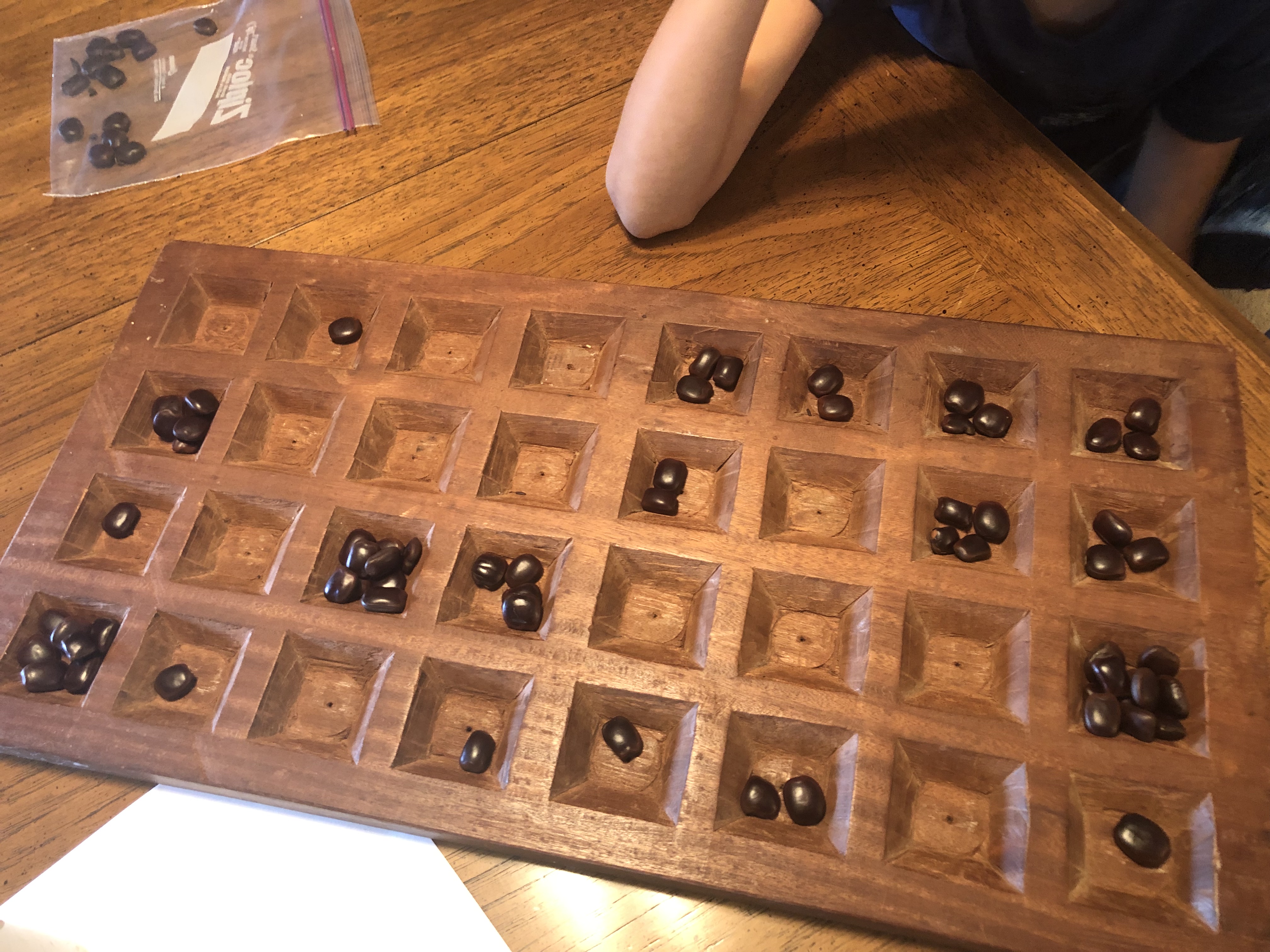Kisolo on:
[Wikipedia]
[Google]
[Amazon]
 Kisolo (also spelled Chisolo) is a traditional
Kisolo (also spelled Chisolo) is a traditional Aimee H.C. Bessire, ''A Short Tour of the Sukuma Museum''
The board used to play Kisolo varies in size depending on common practice and region on the African continent . A board with 32 pits; 4x8 (i.e., 4 rows of 8 pits) is played in the northwestern region of Democratic Republic of Congo. The board in other regions may be is 4x7, i.e., 4 rows of 7 pits each, although there are also Kisolo boards that have 6 pits per row. At game setup, most normally 2 seeds are placed in each pit but some regions start with 3 seeds. Traditionally, seeds from the ''ngola'' tree ('' Pictantus makombo'') or the ''menga'' tree ('' Canarium schweinfurtii'') are used, or small stones. The stones represent cattle.
 Kisolo (also spelled Chisolo) is a traditional
Kisolo (also spelled Chisolo) is a traditional mancala
Mancala ( ''manqalah'') is a family of two-player Turns, rounds and time-keeping systems in games, turn-based Strategy game, strategy board games played with small stones, beans, marbles or seeds and rows of holes or pits in the earth, a board ...
game played by the Luba
Luba may refer to:
Geography
*Kingdom of Luba, a pre-colonial Central African empire
*Ľubá, a village and municipality in the Nitra region of south-west Slovakia
* Luba, Abra, a municipality in the Philippines
*Luba, Equatorial Guinea, a town ...
, Lulua and Songye
The Songye people, sometimes written Songe, are a Bantu peoples, Bantu ethnic group from the central Democratic Republic of the Congo. They speak the Songe language. They inhabit a vast territory between the Sankuru River, Sankuru/Lulibash river i ...
peoples of DR Congo
The Democratic Republic of the Congo (DRC), also known as the DR Congo, Congo-Kinshasa, or simply the Congo (the last ambiguously also referring to the neighbouring Republic of the Congo), is a country in Central Africa. By land area, it is t ...
, Zambia and Zimbabwe
file:Zimbabwe, relief map.jpg, upright=1.22, Zimbabwe, relief map
Zimbabwe, officially the Republic of Zimbabwe, is a landlocked country in Southeast Africa, between the Zambezi and Limpopo Rivers, bordered by South Africa to the south, Bots ...
. It is closely related to other East Africa
East Africa, also known as Eastern Africa or the East of Africa, is a region at the eastern edge of the Africa, African continent, distinguished by its unique geographical, historical, and cultural landscape. Defined in varying scopes, the regi ...
n mancalas such as Bao
Bao or BAO may refer to:
Cuisine
* Baozi, a type of Chinese dumpling made of a steamed or baked bun with fillings
* Cha siu bao, a pork-filled steamed bun
* Gua bao, steamed clam-shaped bun sandwiched with meat and condiments
* Bánh bao, Vietname ...
, Bao Kiarabu, Coro and Isolo
Isolo (also known as Isumbi) is a traditional mancala game played by the Sukuma people in northern Tanzania. The rules of the game come in three variants, respectively for women, boys and men.
Equipment
The board used to play Isolo (also known a ...
.The board used to play Kisolo varies in size depending on common practice and region on the African continent . A board with 32 pits; 4x8 (i.e., 4 rows of 8 pits) is played in the northwestern region of Democratic Republic of Congo. The board in other regions may be is 4x7, i.e., 4 rows of 7 pits each, although there are also Kisolo boards that have 6 pits per row. At game setup, most normally 2 seeds are placed in each pit but some regions start with 3 seeds. Traditionally, seeds from the ''ngola'' tree ('' Pictantus makombo'') or the ''menga'' tree ('' Canarium schweinfurtii'') are used, or small stones. The stones represent cattle.
Rules
In North East Zambia (Ba-Bemba country), the game is played as follows. Each player has two rows of holes (pits), each with two stones in it. {{box, background=tan, radius=1em, {{Mancala hole, 2 {{Mancala hole, 2 {{Mancala hole, 2 {{Mancala hole, 2 {{Mancala hole, 2 {{Mancala hole, 2 {{Mancala hole, 2 {{Mancala hole, 2 {{hr {{Mancala hole, 2 {{Mancala hole, 2 {{Mancala hole, 2 {{Mancala hole, 2 {{Mancala hole, 2 {{Mancala hole, 2 {{Mancala hole, 2 {{Mancala hole, 2 {{hr {{Mancala hole, 2 {{Mancala hole, 2 {{Mancala hole, 2 {{Mancala hole, 2 {{Mancala hole, 2 {{Mancala hole, 2 {{Mancala hole, 2 {{Mancala hole, 2 {{hr {{Mancala hole, 2 {{Mancala hole, 2 {{Mancala hole, 2 {{Mancala hole, 2 {{Mancala hole, 2 {{Mancala hole, 2 {{Mancala hole, 2 {{Mancala hole, 2 They take turns. The first player starts by choosing a hole in their row nearest the opposition. They pick up both stones then moving clockwise they drop a stone into the next hole; on to the next hole and drops another stone there, etc., etc., until they drop the last stone into a hole. If there are stones in that hole, they pick them all up and repeat the process until the drop their last stone into an empty hole. IF there is a stone in the opponent's front hole opposite, they then collect those stones ''and'' the ones in the back row hole, and continue on their way. When they finally run out of stones, either in their back row or in an empty front hole with no opponent's stones in the front hole opposite, then it is their opponent's turn. This continues until neither player can play, because they don't have a stone in their front row. The winner is the one with most stones.Footnotes